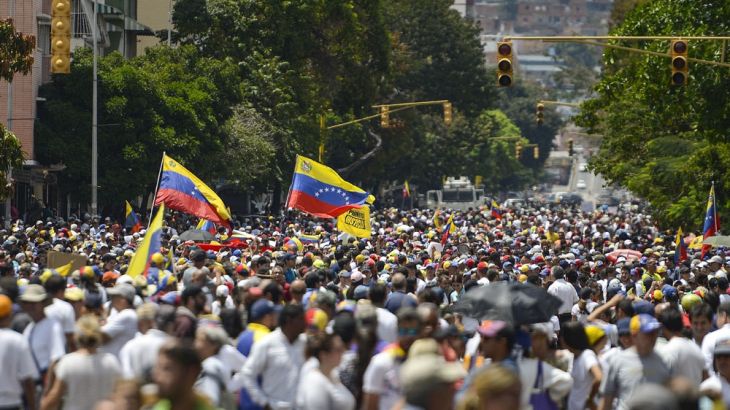Rival rallies held in Caracas as Venezuela crisis intensifies
Government supporters protest against ‘imperialism’, as in another part of Caracas the opposition demands ‘change’.

Thousands of people have once again hit the streets of Venezuela’s capital, Caracas, in the latest rival displays for and against President Nicolas Maduro amid a deepening political crisis.
As a major blackout continued affecting much of the country for the third day, anti-government protesters on Saturday heeded the call of the Washington-backed opposition leader Juan Guaido for renewed rallies demanding Maduro step down.
Keep reading
list of 4 itemsVenezuela opposition figure Guaido in Colombia ahead of summit
Venezuelan court issues warrants for new opposition leaders
Venezuelan government, opposition to resume political talks
Opposition supporters on Victoria Avenue, in western Caracas, pushed against the shields of anti-riot police, who eventually withdrew but maintained a large presence in the area.
“I am tired [of this situation],” Rosa Soriano, an opposition demonstrator, told Al Jazeera. “We can’t continue like this; I lost hope before, but now I believe a change is possible.”
Conversely, red-shirted Maduro supporters turned out for a rival rally near the Miraflores presidential palace, asking the United States to stop “sabotaging” and intervening in the country’s internal affairs.
“We are continuing the battle and victory over the permanent and brutal aggression against our people,” Maduro wrote on Twitter.
“Today, more than ever, we’re anti-imperialists. We will never surrender!”
His supporters said they wanted to let the “imperialism” forces know that they were ready to defend the country.
“This is a project of life and hope for Venezuelans, the message we want to send to the world is that socialism is the [only] way in the country,” Anibal Figueroa, 48, an employee in the Ministry of Education, told Al Jazeera.
Major blackout
The oil-rich nation fell in darkness on Thursday evening, with government critics blaming the blackout on decades of mismanagement and corruption but the ruling socialist party saying it was an act of US sabotage.
On Saturday morning, the power went on and off in parts of Caracas, but other parts of the country continued being without electricity.
Hospitals in Caracas reported major problems over the past three days, while Julio Castro, who leads an NGO called Doctors for Health, said at least 13 people died amid the blackout. His statement could not be independently verified.
Meanwhile, hundreds of passengers were left stranded after flights were cancelled at the capital’s Maiquetia airport on Friday.
In Puerto Ordaz, in southern Venezuela, people said they were struggling to deal with rising temperatures amid the blackout.
“Yesterday, it was difficult to be without power,” a resident, who did not wish to be identified, told Al Jazeera on Saturday.
“We could barely rest as the temperatures were really high; we [practically] didn’t sleep all night, in all darkness, and just waiting with anxiety for this problem to get solved,” he added.
Still, government supporters accused the anti-Maduro front of not acting fairly.
“The Venezuelan opposition does not understand democracy,” Ricardo Leon, editor of El Silbon Information Agency, told Al Jazeera.
“When they have tried it, they have emerged winners – they even won the control of the National Assembly,” he added, referring to polls in 2015.
“We need to talk and through elections call for changes; we can’t solve our problems by letting external powers intervene. We do not accept an interference of that type.”
![Supporters of Venezuelan President Nicolas Maduro demonstrate in Caracas [AFP]](/wp-content/uploads/2019/03/09ad21c35f6241e493f0368b0e7dbe96_18.jpeg)
The growing political crisis comes against the backdrop of major economic uncertainty, exacerbated by years of recession and hyperinflation and widespread shortages of food and medicine.
Tensions escalated in January, when Guaido declared himself interim president and called Maduro a usurper following last year’s presidential elections, which were largely boycotted by the opposition.
The president, on the other hand, argues that Guaido is a puppet of Washington, dismissing his claim to the presidency as a plan from the US-led external powers to control Venezuela’s resources. Around 50 countries, including many Western states, have thrown their weight behind Guaido.
US President Donald Trump, an opponent of Maduro, has said a “military option” is on the table. Opposition leaders in Venezuela have also said all options are considered, but a number of Latin American neighbours have opposed the idea of a US intervention as a way of resolving the turmoil.
Meanwhile, as the crisis keeps lingering, some analysts such as Javier Buenrostro argue the opposition is losing momentum internationally.
“I believe that international leaders are recognising that they rushed with this decision, and that maybe the conditions were not set for generating the change they were aiming for,” Buenrostro, a professor at the National Autonomous University of Mexico, told Al Jazeera.
“Maybe a solution for this is for both sides to compromise. The opposition might need to accept that they can’t have an ‘all-or-nothing’ situation. Both of them might need to reach to a middle point,” he added.
Additional reporting by Alicia Hernandez in Caracas